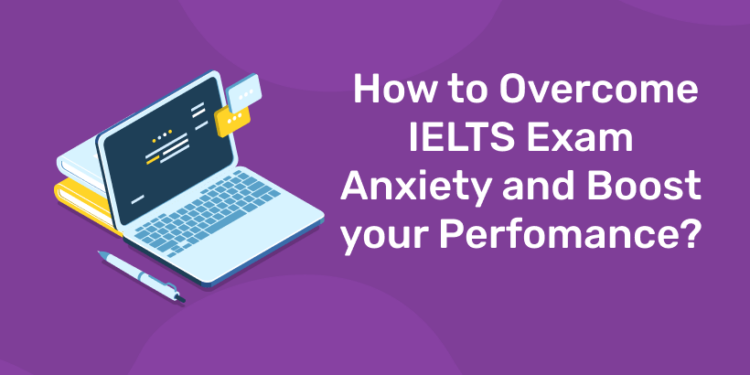Table of Contents
Do you find yourself feeling nervous, anxious, and stressed when thinking about taking the IELTS exam? If so, you’re not alone. Test anxiety is a common issue among many students, and it can impact their performance on exam day. However, with the right preparation and mindset, it is possible to overcome test anxiety and perform at your best.
In this blog post, we will discuss the causes of test anxiety, its symptoms, and tips for overcoming it on IELTS exam day.
What Causes Test Anxiety?
Test anxiety is caused by a combination of fear of failure, lack of preparation, and performance pressure. Many students feel overwhelmed by the thought of taking the IELTS exam and the impact it will have on their future. These feelings can trigger physical and emotional symptoms, such as sweating, shaking, and racing thoughts, that make it difficult to focus and perform well on exam day.
Symptoms of Test Anxiety
Test anxiety can manifest in many ways, both physically and emotionally. Some common symptoms include sweating, shaking, rapid heartbeat, and racing thoughts. Students may also feel overwhelmed, anxious, and stressed, which can impact their ability to focus and perform well on exam day.
Tips for Overcoming IELTS Test Anxiety
Overcoming IELTS exam anxiety is essential to perform at your best during the test. Here are some strategies to help you manage your anxiety and boost your performance:
1. Prepare well in advance
Preparation is key to overcoming test anxiety. Start preparing for the IELTS exam as early as possible and create a solid study plan. Building confidence through practice and repetition is crucial in reducing anxiety levels.
2. Understand the Test Structure
Knowing the IELTS test structure and timing will give you a sense of what to expect during the exam. This understanding can help alleviate some of the anxiety related to the unknown.
3. Mindfulness and Relaxation Techniques
Mindfulness and relaxation techniques, such as deep breathing and meditation, can help reduce anxiety and improve mental well-being. Incorporating these techniques into your daily routine can help you feel more relaxed and focused on exam day.
Stay present during the exam and focus on one question at a time. Mindfulness techniques can help you stay centered and prevent your mind from wandering
4. Positive Self-Talk
Positive self-talk is a powerful tool for managing anxiety. Encouraging yourself with positive affirmations and mantras can help boost your confidence and reduce anxiety levels.
5. Get Adequate Sleep and Exercise
Sleep and exercise play a crucial role in reducing anxiety and improving mental health. Make sure you’re getting enough sleep and exercise in the lead up to the exam to help reduce stress and anxiety levels.
6. Seek Professional Help
If you’re struggling to manage test anxiety on your own, consider seeking help from a therapist or counselor. They can provide support and strategies to help you overcome test anxiety and perform your best on IELTS exam day.
7. Understanding Exam Anxiety
Exam anxiety is a common phenomenon experienced by many test-takers. It can cause a range of physical and emotional symptoms, such as sweaty palms, rapid heartbeat, and difficulty concentrating.
These symptoms can affect performance and lead to poor results. The good news is that there are strategies that you can use to overcome exam anxiety and perform at your best.
8. Prepare Thoroughly
Preparation is key to overcoming exam anxiety. Ensure that you have a solid understanding of the IELTS exam format, and familiarize yourself with the content that will be covered.
Practice with sample test materials, and take advantage of the available online resources. Set yourself achievable study goals and establish a study routine to help you stay on track.
9. Stay Positive
Maintain a positive attitude towards the IELTS exam. Instead of focusing on the potential negative outcomes, focus on the opportunities that the exam presents.
Think of the exam as an opportunity to showcase your language skills and to achieve your goals. Remember, a positive mindset can go a long way in reducing anxiety levels.
10. Use Relaxation Techniques
Relaxation techniques can help to reduce exam anxiety. Deep breathing exercises, progressive muscle relaxation, and visualization are effective methods that you can use to calm your nerves.
Practice these techniques regularly in the lead-up to the exam, and use them during the exam to keep your anxiety levels in check.
crack the ielts exam ! join now !!
11. Get Enough Sleep and Exercise
Getting enough sleep and exercise can help to reduce exam anxiety. Ensure that you get a good night’s sleep before the exam, and try to maintain a regular sleep pattern in the lead-up to the exam.
Exercise can help to reduce stress levels and improve concentration, so make sure to incorporate regular exercise into your study routine.
12. Arrive Early
Arrive at the exam venue early to give yourself time to settle in and to familiarize yourself with the surroundings. Rushing to the exam venue can increase anxiety levels, so make sure to allow plenty of time to get there.
13. Read the Instructions Carefully
Read the instructions for each section of the exam carefully. Ensure that you understand what is required before starting each section. Misunderstandings can cause unnecessary stress and lead to poor performance.
14. Manage Your Time
Time management is critical in the IELTS exam. Ensure that you allocate enough time for each section of the exam, and stick to the allocated time. Pace yourself, and don’t spend too much time on any one question. Remember, unanswered questions are marked as incorrect, so it’s essential to attempt all questions.
15. Don’t Get Stuck on Difficult Questions
If you encounter a challenging question, don’t dwell on it for too long. Move on to the next question and come back to it later if you have time.
16. Accept Imperfection
Remember that it’s okay to make some mistakes. Don’t let one challenging section or question affect your performance on the rest of the test.
Conclusion
Test anxiety can be a significant obstacle to overcome, but with the right preparation and mindset, it is possible to perform at your best on IELTS exam day. Remember to take care of your mental health and well-being, and don’t hesitate to seek professional help if needed. With the right support and strategies, you can overcome test anxiety and achieve your desired score on the IELTS exam.
| Related Links | |
| All About IELTS Exam | IELTS Reading Practice Test |
| IELTS Listening Practice Test | IELTS Writing Practice Test |
| IELTS Speaking Practice Test | Vocabulary in IELTS |










